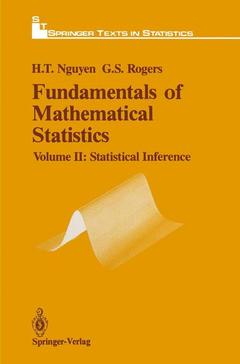Description
Fundamentals of Mathematical Statistics, Softcover reprint of the original 1st ed. 1989
Statistical Inference
Springer Texts in Statistics Series
Authors: Nguyen Hung T., Rogers Gerald S.
Language: English
Subject for Fundamentals of Mathematical Statistics:
52.74 €
In Print (Delivery period: 15 days).
Add to cart
Publication date: 10-2011
422 p. · 15.5x23.5 cm · Paperback
422 p. · 15.5x23.5 cm · Paperback
Description
/li>Contents
/li>
This is a text (divided into two volumes) for a two semester course in Mathematical Statistics at the Senior/Graduate level. The two main pedagogical aspects in these Volumes are: (i) the material is designed in lessons (each for a 50 minute class) with complementary exercises and home work. (ii) although the material is traditional, great care is exerted upon self-contained, rigorous and complete presentations. An elementary introduction to characteristic functions and probability measures and intergration, but not general measure theory in Volume I, allows a complete proof of some central limit theorems and a rigorous treatment of asymptotic of statistical inference. But students need to be familiar only with such things as Jacobians and eigenvalues of matrices. Volume II: Statistical Inference is designed for the second semester and contains a rigorous introduction to Mathematical Statistics, from random samples to asymptotic theory of statistical inference.
IV: Sampling and distributions.- Overview.- Lesson 1 Sampling and statistics.- 2 Transformations of real random variables.- 3 Transformations of random vectors.- 4 Sampling distributions in normal populations-I.- 5 Sampling distributions in normal populations-II.- 6 Order statistics.- 7 Sufficient statistics-I.- 8 Sufficient statistics-II.- 9 Complete statistics.- 10 Exponential families-I.- 11 Exponential families-II.- V: Statistical estimation.- Overview.- Lesson 1 Point estimation of parameters.- 2 Conditional expectation.- 3 Uniformly minimum variance unbiased estimators.- 4 Efficient estimators.- 5 Unbiased estimation: the vector case.- 6 Two methods of point estimation.- 7 Maximum likelihood estimation.- 8 Confidence interval estimation-I.- 9 Confidence interval estimation-II.- 10 Consistent estimators.- 11 Consistency of maximum likelihood estimators.- 12 Asymptotic normality.- 13 Asymptotic normality of maximum likelihood estimators.- 14 Asymptotic efficiency and large sample confidence intervals.- VI: Testing hypotheses.- Overview.- Lesson 1 Neyman-Pearson theory-I.- 2 Neyman-Pearson theory-II.- 3 Testing with monotone likelihood ratios.- 4 Testing when the support contains parameters.- 5 Unbiased tests.- 6 Quadratic forms in normal random variables.- 7 Likelihood ratio tests-I.- 8 One-way analysis of variance.- 9 Likelihood ratio tests-II.- 10 LRT-asymptotic distributions.- 11 Summary of tests for normal populations.- 12 Tests for two-by-two tables.- VII: Special topics.- Overview.- Lesson 1 Minimax and Bayes estimators-I.- 2 Minimax and Bayes estimators-II.- 3 Equivariant estimators.- 4 Simple linear regression-I.- 5 Simple linear regression-II.- 6 Sufficient statistics and uniformly most powerful tests.- 7 Sequential probability ratio tests.- 8 A test by Mann, Whitney, Wilcoxon.- 9 Tests for paired comparisons.- 10 Tests of Kolmogorov, Smirnov type.- 11 Categorical data.- Tables.- References.
© 2024 LAVOISIER S.A.S.




